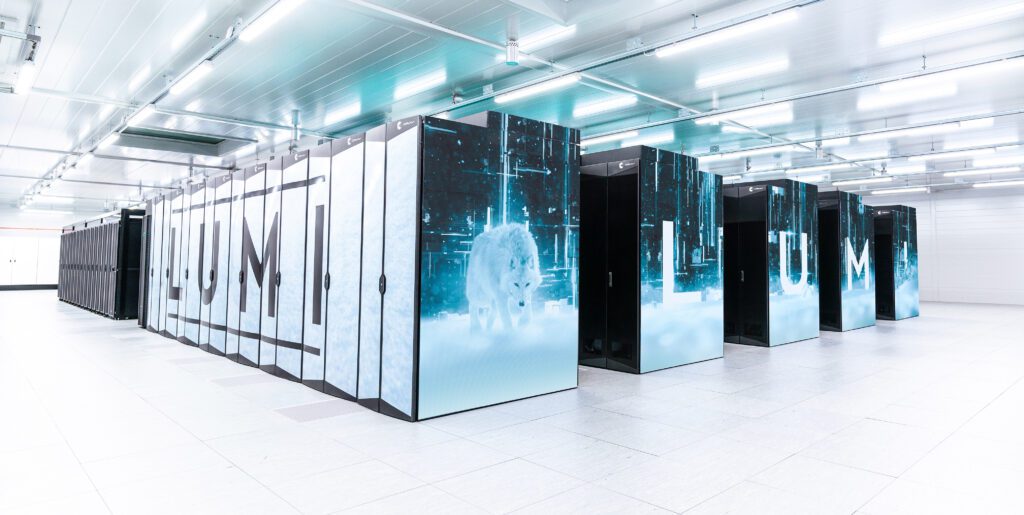Artificial Intelligence
Future Telecoms
Quantum
Wise words and waggishness… July 2025
Reading time: 3 mins
Bristol is rapidly solidifying its position as the UK’s leading hub for artificial intelligence research and innovation – and to those in the know, this is no surprise.
When the UK government announced last September that the University of Bristol was selected to host one of the world’s most powerful supercomputers it was, according to the university’s Professor Simon McIntosh-Smith, “a huge leap forward for AI computational power in the UK.”
This new national supercomputer, called Isambard-AI and based at the Isambard National Research Facility, where McIntosh-Smith is director, will be dedicated to propelling AI research. Housed in shipping containers at the National Composites Centre (NCC), it is due to go live this summer and will be the focal point of the UK’s AI strategy.
“We need to make it a resource that is available to researchers… so they don’t need to be AI experts to take advantage.”
Nigel Toon, Graphcore CEO and UKRI board member
Science, Innovation and Technology Secretary Michelle Donelan said, “The Isambard-AI cluster will be one of the most powerful supercomputers in Europe, and will help industry experts and researchers harness the game-changing potential of AI, including through the mission-critical work of our Frontier AI Taskforce.”
The fact that it is being built and housed in Bristol comes as no surprise, as the region has a rich innovation history. For example, the University of Bristol is home to the UKRI Centre for Doctoral Training in Interactive Artificial Intelligence and it is recognised as a key hub for quantum technologies. Combined with the University of Bristol’s world-class research and spinouts, such as Kaedim (which recently bagged an $11m investment from Andreessen Horowitz) and leading AI chip innovator Graphcore, Bristol offers a uniquely potent environment for AI breakthroughs.
Bristol’s rise as an AI powerhouse stems from a long history of computing innovation. The city’s roots in chip design, tracing back to Inmos, gave rise to today’s “Silicon Gorge” – a vibrant ecosystem of technology, engineering, and creative industries. This foundation, along with a tight-knit collaboration between academia, industry, and research centres, has propelled Bristol’s tech sector forward (helped along the way by organisations such as TechSPARK dedicated to connecting and supporting innovators in the region). Successful companies like Graphcore demonstrate the power of this collaborative environment and data on investment, while tech job growth further confirms the flourishing tech scene in the region.

The UK’s investment in Isambard-AI highlights the increasing importance of technological sovereignty in the competitive AI field. A powerful domestic AI infrastructure allows British researchers to lead the way in developing ethical, safe, and impactful AI technologies without relying entirely on external providers.
Other nations are taking similar steps. The USA has heavily invested in supercomputing centres and AI research initiatives, while China has bold plans to establish its dominance in AI development. And even though the EU lags behind China and the USA when it comes to funding, it has developed and funded a number of powerful and impressive high performance computer projects, including LUMI (in Finland), Leonardo (Italy) and MareNostrum (Spain).
Bristol is therefore joining a network of global cities at the forefront of supercomputing and AI research. The USA, China, and Japan lead the way when it comes to pure power (though there is not much information available on China), but Europe is home to some serious supercomputer hubs.


Let’s look at some of the key sites:
Hewlett Packard Enterprise (HPE) is behind the design and delivery of Isambard-AI. It will leverage next-generation HPE Cray EX supercomputers and over 5,000 cutting-edge NVIDIA GH200 superchips. This advanced architecture is designed to give Isambard-AI the power to reach up to 200 quadrillion calculations per second (200 Petaflops), placing it firmly in the top tier of European AI supercomputers. But where does 200 Petaflops put Isambard-AI on the global stage?
According to the Top 500, if Isambard-AI hits the 200 Petaflops mark it will be the third fastest computer in Europe, and seventh fastest in the world.
Pflops and Exaflops are ways to measure how powerful a supercomputer is. They represent the number of calculations a computer can perform in a single second. Here’s a breakdown:


Supercomputer power is constantly evolving. And though Isambard-AI’s specs are clearly impressive now, its continuing position in the global top 10 depends on the evolution of existing systems or the creation of new supercomputers. Isambard-AI’s true value lies not just in its raw power but in its AI-optimised design. This matters more for the kinds of research Bristol envisions.
Bristol’s ambition goes beyond raw computing power. Nigel Toon, CEO of Graphcore and a member of the board of UKRI (which funds Isambard-AI), envisions the supercomputer as a transformative tool for UK researchers. Bristol Innovations Foresight attended a recent EntreConf event where he talked about his book How AI Thinks and asked him what he would do with Isambard-AI if he was in charge. He believes Isambard-AI should focus on these key areas:
Isambard-AI promises to be a catalyst for Bristol’s booming tech sector. It will enable world-leading AI research, drawing top talent, boosting investment, and fostering new AI-powered businesses. Bristol is poised to become an internationally recognised AI powerhouse, fueling economic growth and breakthroughs with far-reaching impact.As Ian Buck, vice president of hyperscale and HPC (high-performance computing) at Nvidia, said at the initial announcement of Isambard-AI, “in building one of the world’s fastest AI supercomputers, the UK is demonstrating the importance for nations to create their own infrastructure. Isambard-AI will provide researchers with the same state-of-the-art AI and HPC compute resources used by the world’s leading AI pioneers, enabling the UK to introduce the next wave of AI and scientific breakthroughs.”



Founder and Managing Partner at Digital DNA a consultancy practice that helps businesses innovate, adapt and thrive. Advises startups, Bristol innovations and the venture studio Gravitywell. Founder of TechSPARK and The SPARKies.
Quantum
Reading time: 10 mins
Quantum
Reading time: 10 mins
Quantum
Reading time: 11 mins
Robotics
Reading time: 1 mins
Quantum
Reading time: 3 mins